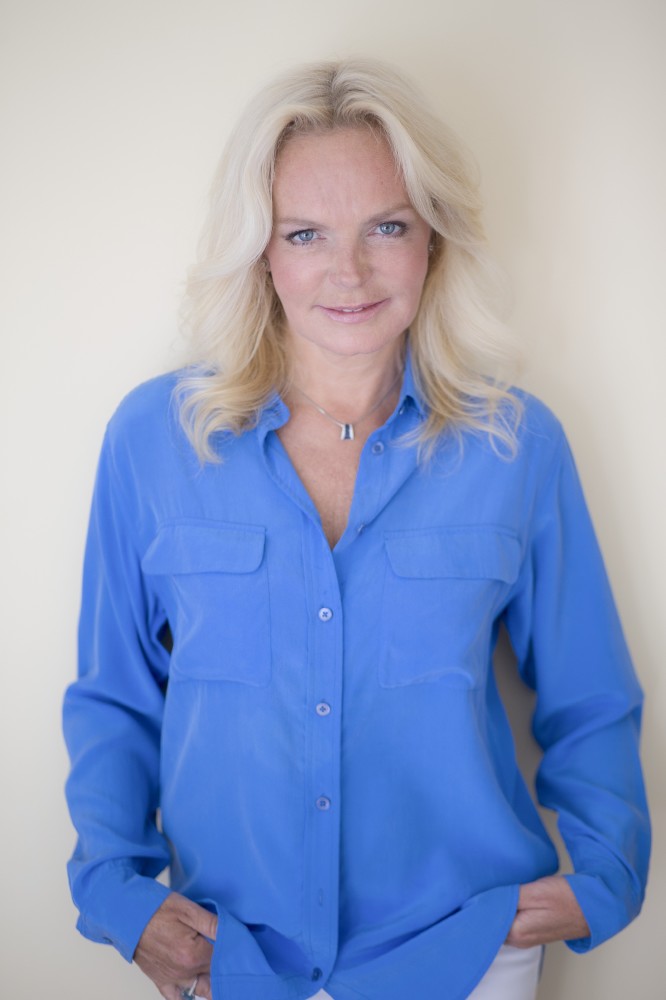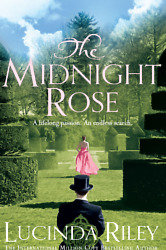
Lucinda Riley

‘The Midnight Rose’ is a huge, epic story following the lives of two very special women. The story spans a hundred years, beginning in India in 1910, when we meet ten-year-old Anahita who forges a lifelong friendship with Princess Indira and subsequently becomes her companion. Travelling to a boarding school in England, Anahita meets Lord Donald Astbury, and when their harrowing war-time experience reunites them a few years later, their feelings for each other blossom into love, a situation that does not please Lady Maud Astbury, Donald’s mother …
In the present, we follow a young actress, Rebecca Bradley, who arrives at Astbury Hall to shoot a film set in the 1920’s. When the current Lord Astbury – Anthony – sees Rebecca, he is stunned by her uncanny resemblance to his late grandmother, Violet. As Rebecca tries to understand her connection to a tragic love affair long ago, the past and the present collide to a shocking conclusion.
As for the inspiration, I’ve always been fascinated by India - its differing cultures and diverse landscapes. In fact, the entire country presents such a vivid, rich tapestry that it naturally provides the kind of colourful, exotic background I so adore writing about. Also I vaguely knew that my ancestors had been resident in India at the turn of the last century, although I knew nothing else about them when I began the book … It’s my most ambitious story to date and when I started, I didn’t quite know what I was letting myself in for!
Why are your characters always so unforgettable?
If they are, that’s a lovely compliment! Maybe it’s because they are so real in my head when I write their stories. Literally, for me anyway, they exist and I always find myself empathising with their pain and joy.
Why has this book been praised for being your most ambitious novel yet?
Simply because the book spans 100 years and is set in India so research alone was complex. Also the book explores a number of relationships and the difficulties of bridging the gap between cultures, social classes and levels of wealth.
For example, in the Western world, few people these days bat an eyelid at a mixed-race marriage. The British class system is thankfully far less rigid than it was in Donald Astbury’s day. I think money and celebrity have largely replaced the notion of ‘breeding’ when it comes to someone’s status in society. Yet in the East, and of course in India, the caste system still continues and equality for women from poor backgrounds is not yet a reality. Many people in Europe complain about the influx of other nationalities into their society, but every person who does should spend a day on the streets of Delhi before they judge others for wanting to make a better life for themselves.
Please tell us about the character of Anahita.
Anahita is probably my favourite character ever. She's so gentle, loyal and clever, with an acceptance of the way we can only control our own destiny only up to a point. She also listens to her instincts, which is a way of living that comes naturally to me.
You wrote your first book when you were 24, so at what age did you know that you had a talent for writing?
I always had a very vivid imagination and as a child spent much of my free time making up stories. So it wasn’t anything to do with whether I had a talent, as much as a passion for writing. It always seemed to come naturally.
To what extent do you think that writers get better as they gain more life experience?
Certainly in my case, I am sure that life experience has improved me as an author. I wrote my first book at 24, and when I read it now I realise how innocent I was. Today my characters have far more depth and I definitely use some of my own experiences when I’m creating them. The phrase ‘older and wiser’ rings very true.
Which are your favourite authors and who has inspired you most?
The writers who inspire me the most are F. Scott Fitzgerald (The Great Gatsby), Edith Wharton (The Custom of the Country) and Evelyn Waugh (Brideshead Revisited).
What is your writing process?
I know I’m not typical amongst authors, in that I don’t keep notes or ‘storyboard’ a novel. Once I’ve had the initial inspiration, the story and characters begin to form in my imagination, then I dust off my trusty little voice recorder and start talking into my dictaphone. ‘Dick’ - as I affectionately call him - and I, have a love/hate relationship. I spend long hours with him as I speak to him in strange positions (I can’t sit in a chair during this process, I have to sit on a floor or walk, and for some reason, write better outside in the open air) and act out the characters. As an ex-actress, I find it hugely beneficial to speak the dialogue out loud. I spend weeks talking to myself – my kids think I’m banana’s, especially as I add the punctuation as I go. They often come in and say;
‘hello comma darling comma how are you question mark space new line’ !
I then hand it to Olivia, my long-suffering PA, who then has the unenviable task of converting my verbal ‘vomit’ into words on a real page.
For the first draft of The Past, I have to go away to write it, as it’s too difficult to maintain focus when I’m at home, with all the distractions that entails. Knowing I have a limited time before I need to get back to my family concentrates my mind wonderfully. Where I go at this time depends on where the book is set.
What is next for you?
I’ve just finished writing the first of a unique series of seven books called ‘The Seven Sisters’. These books – each one following the story of an individual sister –is based loosely on the mythology surrounding the famous star cluster.
Book one, entitled ‘Maia’ is set in Geneva – the childhood home of all the sisters – who gather together when they are told that their beloved father, Pa Salt, has died. I’m not saying anymore about the over-arching plot, but the first book follows Maia as she discovers her past and comes to terms with her present. It’s set in Rio de Janeiro in Brazil in the 1920’s and Paris.
Also I’ve re-edited one of my favorite books from earlier in my career, which is now being published in August 2014 as ‘The Italian Girl’.

